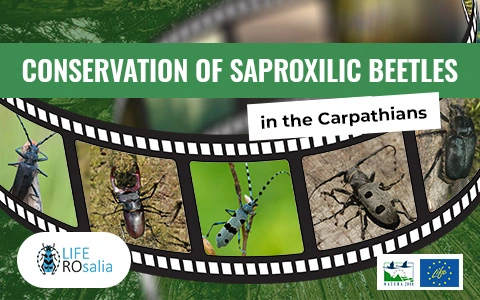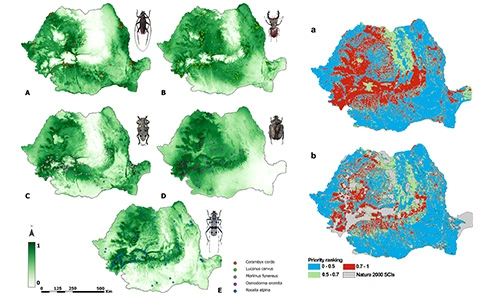The European Commission has approved funding for the LIFE ROsalia project
The European Commission has approved funding for the LIFE ROsalia project, which is part of the 34 LIFE projects in the field of nature and biodiversity, which will support the implementation of the EU Birds Directive and the Habitats Directive, as well as the EU Biodiversity Strategy for 2030. The project was selected from over 1,250 proposals submitted in 2019 for the LIFE program. The LIFE program is the EU’s funding instrument for the environment and climate policy. It has been running since 1992 and has co-financed over 5,500 projects across the EU and in third countries.
Coordinated by the Agency for Environmental Protection Vrancea (APM Vn), the LIFE ROsalia project aims to improve habitat conditions for five species of saproxyl insects – species of beetles that live in decaying or rotting wood – in the forests of the Natural Park Putna-Vrancea.
The project has an implementation period of five years, in the period 2020-2025 and is implemented in partnership with the University of Bucharest, through the Center for Environmental Research and Impact Studies (CCMESI), National Directorate of Forests – Romsilva through Putna-Vrancea Natural Park Administration and the Association for the Conservation of Biological Diversity (ACDB)
The team responsible for this project will create better ecological links between the fragmented parts of forests with old trees by creating 22 favorable habitat areas for saproxylic insect species, which are dependent on dead or decaying wood. The removal of old trees and dead wood has led to a sharp decline in saproxylic insects in the Carpathians.
The team’s actions will also include the provision of artificial habitats and the establishment of a participatory monitoring system with foresters and rangers from the protected area administration. The project team will also create a legally binding national action plan for the long-term conservation of saproxylic insects.
The targeting of European funds for the conservation of this type of insects – beetles – in the area of the Carpathian Mountains is also a measure of cooperation with forest managers within the Natura 2000 site Putna-Vrancea.
“LIFE projects can really lead to a concrete change on the ground. They provide solutions to some of the worst challenges of our time, such as climate change, the destruction of nature and the unsustainable use of resources. „If they are reproduced quickly and widely throughout the EU, they can help the EU achieve its ambitious goals set out in the European Green Pact and help build a greener and more resilient Europe for all of us, but also for future generations.” said Environment, Oceans and Fisheries Commissioner Virginijus Sinkevicius.
„These projects will contribute to the objectives of the European Green Pact by supporting the EU Biodiversity Strategy and the Economic Action Plan.
circular and will help the ecological recovery from the coronavirus pandemic and transform Europe into a climate-neutral continent by 2050, ”is the European Commission’s message at the launch of the LIFE program.
The European Commission’s concern for protecting and enhancing Europe’s biodiversity is a constant. Thus, other projects selected for funding with European funds include those aimed at the environment and resource efficiency, nature and biodiversity, governance and information in the field of environment, combating the effects of climate change and adapting to them, and governance and information in the field. .
Other funds will go to projects to prevent food waste and improve waste management and restore peatlands – unique ecosystems that house many species adapted to the environment in which they live, rare and endangered – as well as reducing greenhouse gas emissions. , in line with the Commission’s Climate 2030 Plan.






